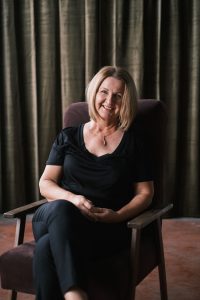 Bernie McGill is the winner of the 2023 Edge Hill Short Story Prize for her collection, This Train is For. She is the author of two novels and one previous short story collection, Sleepwalkers, originally published by Whittrick Press in 2013 and re-published by No Alibis Press in 2025. She has written audio scripts for heritage projects and stage scripts for theatre. She is a Writing for Life Fellow with the Royal Literary Fund and an honorary member of The Linen Hall Library in which building her writing archive is held.
Bernie McGill is the winner of the 2023 Edge Hill Short Story Prize for her collection, This Train is For. She is the author of two novels and one previous short story collection, Sleepwalkers, originally published by Whittrick Press in 2013 and re-published by No Alibis Press in 2025. She has written audio scripts for heritage projects and stage scripts for theatre. She is a Writing for Life Fellow with the Royal Literary Fund and an honorary member of The Linen Hall Library in which building her writing archive is held.
Read Bernie’s most recent short story ‘People in the Wind’ in the Irish Times, August 2024.
Listen to Bernie’s short story ‘At Heart Centre’ read by Seána Kerslake on BBC Radio 4.
Listen to Bernie’s essay ‘Our Art’ (read by the author) on BBC Radio 3.
Listen to Bernie’s short story ‘Waiting for Joseph’ read by Julia Dearden on BBC Radio 4.
Bernie was born in Lavey in County Derry in Northern Ireland. She studied English and Italian at Queen’s University, Belfast and graduated with a Masters degree in Irish Writing. Her novel The Watch House was nominated in 2019 for the Ireland/European Union Prize for Literature and The Butterfly Cabinet was named in 2012 by Downton Abbey creator Julian Fellowes as his novel of the year. Her first short story collection, Sleepwalkers, was short listed in 2014 for the Edge Hill Short Story Prize. Her short fiction has been nominated for numerous awards and in 2008 she won the Zoetrope:All-Story Short Fiction Award in the US. Her work has been anthologised in award-winning collections The Long Gaze Back and The Glass Shore and more recently in The Black Dreams, Her Other Language, The Danger & the Glory, Belfast Stories and in Female Lines. She is a recipient of a number of Arts Council of Northern Ireland Awards, including an International Artists’ Development Fund Award to attend the Vittore Branca Centre at the Giorgio Cini Foundation in June 2023. She is a former Writing Fellow with the Royal Literary Fund (RLF) in the School of English and in the School of Computer Science, Queen’s University, Belfast and is a current Writing for Life Fellow with the RLF. She offers One-to-one Mentoring for fiction writers via the Irish Writers’ Centre. For public readings, writing workshops etc. check out Upcoming Events. You can contact Bernie directly here.
